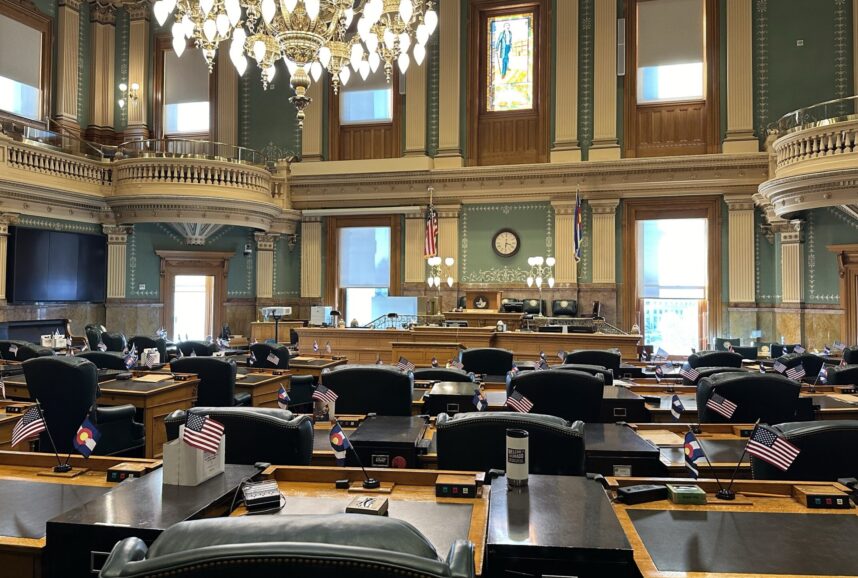The Colorado Legislature this month approved a bill that directs the Office of the State Auditor to commission an updated study comparing the value of PERA’s hybrid defined benefit (DB) plan to other plan designs.
House Bill 1427 calls for the State Auditor, in cooperation with PERA, to enlist an independent actuarial firm experienced with public pensions to conduct a comprehensive study comparing the cost and effectiveness of the PERA DB Plan to alternative plan designs, as well as providing an analysis of certain aspects of PERA current defined benefit and defined contribution plans.
The study will be similar in scope and purpose to a study that took place following similar legislation in 2014. That study compared various facets of the PERA DB Plan—such as cost per member, contribution rates, income replacement ratio, and portability—to other public and private sector plan types, including Social Security. The study concluded that PERA’s plan provides a better benefit at a lower cost than other plans, making it the best option for providing retirement benefits to the state’s public employees.
READ MORE: Key PERA Features Make Colorado’s Largest Retirement Plan Efficient and Effective (from 2015)
As Colorado’s public workforce evolves, it’s important that Colorado PERA remain flexible enough to meet the membership’s changing needs. This study will help policymakers assess PERA’s continued value in recruiting and retaining a highly qualified public workforce in the years ahead.
If HB24-1427 is signed into law, the State Auditor and PERA will have until the end of October to select an actuarial firm. When the study is complete, PERA and the State Auditor will provide a report of the study’s findings to the governor, the Joint Budget Committee, the Legislative Audit Committee, and the House and Senate Finance Committees.
In addition to HB24-1427, lawmakers have passed two other PERA-related bills, both of which will expand provisions for PERA members who return to work in retirement. Those bills have been sent to the governor for his signature.
RELATED: 2024 Proposed Legislation Status
PortabilityThe ability to take an existing retirement plan with you when you change employers.Hybrid defined benefitPERA’s Defined Benefit (DB) Plan is “hybrid” in that it combines features of a traditional DB plan with some of the features of defined contribution (DC) plans, such as portability.Defined benefitAlso known as a pension, this is a type of pooled retirement plan in which the plan promises to pay a lifetime benefit to the employee at retirement. The plan manages investments on behalf of members, and the retirement benefit is based on factors such as age at retirement, years of employment and salary history.Defined contributionA type of individual retirement plan in which an employee saves a portion of each paycheck (along with a potential employer match) and invests that money. The employee’s retirement benefit is based on their account balance at retirement. A 401(k) is a type of defined contribution plan.





Why do we need to study this? I guess it enriches the people doing the study. I have a wild guess, but I think a study on restoring the COLA would show a significant increase to the health and welfare of Colorado PERA retirees.
I totally agree. PERA was MANDATORY not a choice when I went to work for UNC. I was told it would be as good or better than Social Security which I had paid into for at least 15-20 years. It isn’t!
Agree! Retirees should never have been included/penalized as part of PERA’s attempts to restore full funding. Robbing retirees of COLAs we worked decades for and thought we would get during retirement has never made sense–except to PERA. I and others worked non-PERA jobs for years after retiring but when you can no longer work, a 1% or less COLA is nothing and just gets taken in taxes. At least while working we often got raises from the Long Bill, but retirees are stuck and hurting. Many of us will long be gone before PERA ever reaches full funding– IF they ever reach it at all! So all we did was sacrifice for future retirees–and most of us don’t have kids even working within the PERA system! Shouldn’t be paying their retirement even if I did have IMO!!
We do need to restore COLA. When I retired over 9 years ago, I based my retirement on this increase. With the freezes and low increases (such as 1%), you get further behind every year.
COLA is the main issue. However, PERA just seems to ignore it.
South Dakota pays both state pension and social security.
Just compare to PERA. Won’t have all your eggs in one basket
and you could receive two COLAs per year!
Limiting SS payments because worker has PERA is hurtful to living on retirement. Also limiting spousal benefit for death of spouse cuts the income of surviving spouse because surging spouse has PERA is also not sustainable for surviving spouse to maintain level of required financial security.
Worker should get SS as per those years worked AND PERA for those years worked.
Stop limiting SS income.
Only the U.S. Congress can repeal the Social Security WEP/GPO laws that steal old-age benefits from many PERA-retirees and their spouses who paid into Social Security. Both of Colorado’s Senators and all but two U.S. Reps cosponsor legislation that would repeal WEP/GPO penalization. The two Reps who haven’t cosponsored H.R.82 are: @RepKenBuck
@RepDLamborn.
(Their constituents need to hear from them daily!)
The legislature cannot resist trying to find an excuse to reduce benefits or completely change the system because of “changing needs”? What changing needs? We need to get our benfits to keep up with inflation!
What has happened to our COLA? We have gotten very little in the last 3 or 4 years. Inflation is up at least 10-15 percent in that time.
Hi John, the PERA Board and staff are aware and sensitive to the slippage of purchasing power our retirees and other beneficiaries are experiencing due to inflation. We have been hearing from many retirees and we know it’s a very challenging situation.
Under the reforms of Senate Bill 200 in 2018, PERA is required to reach full funding by 2048, and as a result, the annual increase paid to retirees each year adjusts up or down based on funding progress and cannot exceed 2% while PERA still has unfunded liabilities. This is set in statute and is meant to ensure that we can continue paying benefits for current and future retirees — we are obligated to pay benefits not just now but for many decades to come. Increasing benefits beyond what’s permitted in statute would increase plan costs, thereby extending the time it would take PERA to pay down that unfunded liability, and the PERA Board remains committed to that 100% funding goal. Ensuring the sustainability of the fund is vital to our mission and PERA’s future.
Love how you blame SB 200. You guys supported it completely, making you the only state retirement system to actively support legislation which hurt its retirees—like you were to dumb to think inflation would ever happen again.
Your use of the word “slippage” is insensitive to retirees who depend on PERA. Basic nutrition, medical copays, and utility costs inflate many times more than PERA’s 1% COLA. We haven’t slipped. We’ve fallen and we can’t get up.
Slipped? Fallen? Pushed? It’s more like, “Thrown under the bus!”
I have never been convinced that 100% funding was absolutely necessary for PERA’s DB plan to achieve long term stability. On the other hand extremely low funding would have to be out of the question. But at what cost do we chase the 100% goal?
It has been a long held maximum (since the 1980’s) that retirement plans should NEVER be fully funded! The two main reason against full-funding are: 1.) It means capital is not being properly deployed as money can earn greater returns, or used for wages (to attract and reward talent), rather than sitting around fro 30 years usually earning low, but safe, returns relative to other investments (in the case of public sector retirement plans, it means taxes can be lower by not having to make higher contributions for governmental employers, unless the governmental entity embezzles the money, see No. 2); &
2.) Excess reserves make the parties involved argue about whom should be allowed to access those funds for lower contribution rates, higher benefits, or greater plan administrator compensation… once PERA was over-funded, the thieves (politicians) showed up.
2.)
Dear PERA Representative,
In your response to John’s comment (above) you once again hid behind the statute and left out the part about PERA supporting, recommending and lobbying for every piece of legislation that reduced the Annual Increases, including Senate Bill 200 in 2018. The “commitment” you reference is fine, its the method PERA chose to use in order to accomplish it that was a wrongful Act.
Please ask the new guy, PERA CEO/Executive Director Andrew Roth, to write an article for PERA On The Issues explaining his perspective on this practice PERA employed to attempt to accomplish full funding at the expense of decreasing the purchasing power and standard of living for current retirees?
We would like to hear the new guy address these issues head on and use PERA On The Issues as his vehicle for doing so. Prior PERA leaders took the easy way out with a convoluted rationale that it was necessary to resolve the funding issues by gutting our Annual Increases and thereby eliminating our ability to keep up with the ever rising cost of living. They called that last part, sharing the pain.
We would like to see the new guy write about whether he has taken a fresh look at what PERA (and the legislature) did now that he has the ability to put fresh eyes on their approach alongside the extraordinary cost of living data over the last 10 years. That data clearly shows the devastating impact of these prior bad Acts on the purchasing power of real people who retired with a reasonable expectation they would receive Annual Increases that would enable them to maintain their purchasing power.
Does he have a more enlightened perspective and perhaps better ideas about how to maintain fund solvency without inflicting further economic pain on retirees? Can he make a more humane commitment to pensioners on behalf of PERA to promote new ideas in the legislature that will ensure retirees don’t continue to shoulder the responsibility for sustaining the solvency of the fund?
Is he willing to get out in front of the need to establish a real COLA with the same level of “commitment” his predecessors made to gut our Annual Increase?
We will be looking for an in depth article from Mr. Roth not from the apostles of prior PERA leaders spouting boilerplate rhetoric that was at best, disingenuous. I won’t hold my breath waiting for the requested article but I’m all for giving the new guy the opportunity to demonstrate he is not the same as the old guys.
I hope that Polis is out of office before that study reaches his office!!! And according to the CPI, in the last six years we have received a 4.5% increase while the CPI for the majority of the state is 20.9% !!!! SO what BENEFITS and PLANS need to be studied???? Where are our elected legislators and lobbyists? WOW any politician with common sense would see that the left hand doesn’t … oh … common sense!!!
Anyone afflicted by unfair WEP/GPO must urge Gov. Polis to advocate for a state resolution that calls for repeal of federal WEP/GPO penalization laws. The governors of California, Illinois, Louisiana, and Ohio have signed such resolutions.
Only the U.S. Congress can repeal the Social Security WEP/GPO laws that steal old-age benefits from many PERA-retirees and their spouses who paid into Social Security. Both of Colorado’s Senators and all but two U.S. Reps cosponsor legislation that would repeal WEP/GPO penalization. The two Reps who haven’t cosponsored H.R.82 are: @RepKenBuck
@RepDLamborn.
(Their constituents need to hear from them daily!)
FORGET STATE AUDITOR STUDY (CALL THE COPS… ROBERY IN PROGRESS!!!)
The state auditor voted for stealing our COLA when he was in the legislature, and the Colorado Supreme Court upheld a fairytale of a state defense to essentially reduce our benefits (whenever a bit of inflation occurs).
The offices that ought to do something are the U.S. Attorney’s Office, the State Attorney General, or Denver’s District Attorney; but they’re headed by political party hacks who raided PERA and stole our COLA in the first place; and any so-called audit or study from the state auditor’s office will only be used to justify increasing current worker’s salaries while leaving retirees hanging.
THERE’S A ROBBERY IN PROGRESS AND LAWMAKERS SIT THERE WITH THEIR FINGERS IN THE….. AIR, CHECKING THE POLITICAL WINDS TO SEE HOW LONG THEY CAN BLOW-OFF RETIREES!
STOP THE THEFT NOW!
Dear PERA Representative,
PERA supported, recommended and lobbied for every piece of legislation that reduced the Annual Increases, including Senate Bill 200 in 2018. The “commitment” you reference in your reply to John Lucas (above) is fine, its the method PERA chose to use in order to accomplish it that was a wrongful Act.
Please ask the new guy, PERA CEO/Executive Director Andrew Roth, to write an article for PERA On The Issues explaining his perspective on this practice PERA employed to attempt to accomplish full funding at the expense of decreasing the purchasing power and standard of living for current retirees?
We would like to hear the new guy address these issues head on and use PERA On The Issues as his vehicle for doing so. Prior PERA leaders took the easy way out with a convoluted rationale that it was necessary to resolve the funding issues by gutting our Annual Increases and thereby eliminating our ability to keep up with the ever rising cost of living. They called that last part, sharing the pain.
We would like to see the new guy write about whether he has taken a fresh look at what PERA (and the legislature) did now that he has the ability to put fresh eyes on their approach alongside the extraordinary cost of living data over the last 10 years. That data clearly shows the devastating impact of these prior bad Acts on the purchasing power of real people who retired with a reasonable expectation they would receive Annual Increases that would enable them to maintain their purchasing power.
Does he have a more enlightened perspective and perhaps better ideas about how to maintain fund solvency without inflicting further economic pain on retirees? Can he make a more humane commitment to pensioners on behalf of PERA to promote new ideas in the legislature that will ensure retirees don’t continue to shoulder the responsibility for sustaining the solvency of the fund?
Is he willing to get out in front of the need to establish a real COLA with the same level of “commitment” his predecessors made to gut our Annual Increase?
We will be looking for an in depth article from Mr. Roth not from an apostle of prior PERA leaders spouting boilerplate rhetoric that was at best, disingenuous. I won’t hold my breath waiting for the requested article but I’m all for giving the new guy the opportunity to demonstrate he is not the same as the old guys.
Right on, Mr. Paul! The pain PERA and lawmakers gleefully inflicted on retirees (like the alleged fiscal crises wasn’t of their own making) was unconscionable (especially for those already retired). Whether they call it sharing the pain or shared sacrifice, it’s called “risk sharing,” in the language of retirement plan managers… which is just a tricky way of changing a Defined BENEFIT plan into a Defined CONTRIBUTION plan (or “NON-CONTRIBUTION plan,” in the case of employers like the deadbeat state of Colorado).